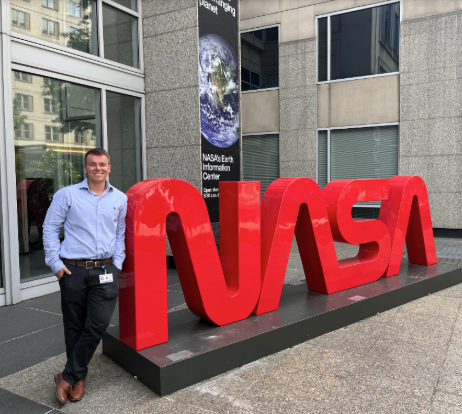
Network with people. I wouldn't have had this amazing opportunity if I didn't step outside my comfort zone and take risks. Go to career and internship fairs, reach out to professors whose work you are interested in, and don't be afraid to ask questions. Fun Fact: my interview for the internship took place over the phone while I was in Venice, Italy during my time abroad in Spring 2024.
Name: Michael O’Neill (Cohort 5)
Major: Mechanical Engineering
Minors: Global Engineering Leadership and General Business
Give a brief description of the experience.
I was an intern at NASA during Summer 2024. I worked on the Low-Cost Optical Terminal (LCOT) project within code 450 (exploration and space communication. At the same time, I worked at HQ on policy and management with Space Communication and Navigation (SCaN) executives.
What was the most impactful part of the experience?
I got exposure to the two things that I'm most interested in: engineering and leadership. LCOT allowed me to work on a more technical project where I was able to be more hands-on and have a direct impact, while SCaN and HQ exposed me to the world of business, policy, government budget appeals, and more.
What surprised you?
The work, but in a good way. Some internships involve you shadowing somebody, reading documents, and not really doing a whole lot. With NASA, however, I got directly assigned to projects that had bigger impacts and would help contribute to supporting the project.
Did you make any personal and/or professional connections with peers?
Yes! SCaN has its own intern program at Goddard called SCaN Internship Program (SIP). With this program, I was put in an office space with 10+ fellow interns who were working on the same or similar projects. I remember having great conversations, morning chats, and fun activities with my fellow interns. As for professional connections, I was warned at the start of the internship that everyone at NASA is a nerd, which is a good and a bad thing. On one hand, they can talk for hours about their work, which is really cool since I'm someone who wants to know more about the impact of engineering. On the other hand, they can talk for hours about their work, so you could be stuck in a 2-hour conversation and become an expert by the end of it.
What were your major takeaways? What did you learn?
I learned that engineering is more than just hardware assembly and robotics like most people think. It also involves leadership, problem solving, collaboration, and ultimately working with others to accomplish real world problems and concerns.
How have your career or academic goals changed or evolved as a result of this experience?
I would love to continue working for NASA, and I know that I picked the right major!
Top